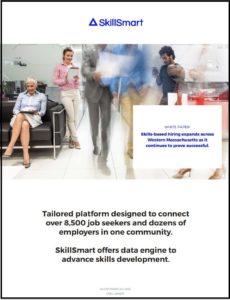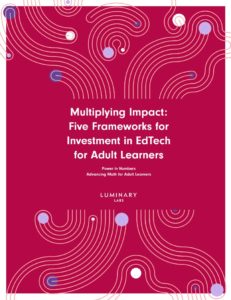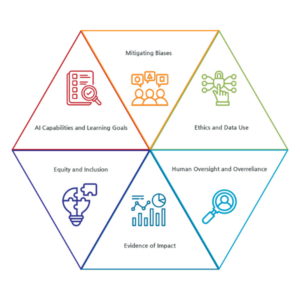 Skillsmart’s white paper, Skills-based hiring expands across Western Massachusetts provides a compelling example of technology ‘screening in’ candidates for work they might not qualify for through a traditional resume. A hospitality company realized that to find candidates with great customer service skills they should consider experience developed through volunteerism (such as being ushers in their places of worship) rather than just in past jobs.
Skillsmart’s white paper, Skills-based hiring expands across Western Massachusetts provides a compelling example of technology ‘screening in’ candidates for work they might not qualify for through a traditional resume. A hospitality company realized that to find candidates with great customer service skills they should consider experience developed through volunteerism (such as being ushers in their places of worship) rather than just in past jobs.
 A new OCTAE report, Multiplying Impact: Five Frameworks for Investment in EdTech for Adult Learners, highlights five high “opportunity areas” for how technology can accelerate impact for adult learners: Supplementing instructors, Designing “for life,” Engaging learners, Building the community, and Making connections. For examples of some of these strategies being deployed around the country, don’t miss our report: How Investment in Technology can Accelerate Impact in Adult Learning.
A new OCTAE report, Multiplying Impact: Five Frameworks for Investment in EdTech for Adult Learners, highlights five high “opportunity areas” for how technology can accelerate impact for adult learners: Supplementing instructors, Designing “for life,” Engaging learners, Building the community, and Making connections. For examples of some of these strategies being deployed around the country, don’t miss our report: How Investment in Technology can Accelerate Impact in Adult Learning.
Critiquing Adult Participation in Education: All three CAPE reports are now published and available on ValueUSA.org. Report 1: on Deterrents & Solutions, Report 2: Motivation Around Adult Education, and Report 3: Technology Use. In our response to the first report, we highlighted the opportunity to leverage educational technologies to overcome most common deterrents to participation, as well as the need for more one-on-one support for digital learners and increased access to high-speed internet.
While further detailing motivations and deterrents, the second two reports further underscore opportunities to leverage technology, and especially through smartphones given their high usage rate. Of note, most non-participants indicated a preference to learn on their own rather than with others, either using technology, through print, or with some help from a tutor. Student interviews suggest that this preference to learn individually for some is due to anxiety and fear about returning to school due to past failures in traditional education. One student mentioned fear of being “called out” by teachers or classmates for falling behind.
This begs the question of how we can leverage technology to create a welcoming, safe reentry point to participation in education. How can we design online and mobile learning opportunities so adults hesitant to rejoin a classroom environment can learn sucessfully in private, at their own pace, and in ways that they are acknowledged and supported as a whole person? If we can help adults get a positive taste of being a student again, the CAPE reports suggest that we could assist millions of more adults in assessing potentially life-changing adult education services.
Share your thoughts on these publications or let us know what you’re reading this month in the comments!
Alison Ascher Webber develops and leads innovative projects for the EdTech Center, including advising the new Employment Technology Fund and leading its field testing across the U.S. as well as supporting mLearning, digital literacy, and tech integration initiatives globally.




